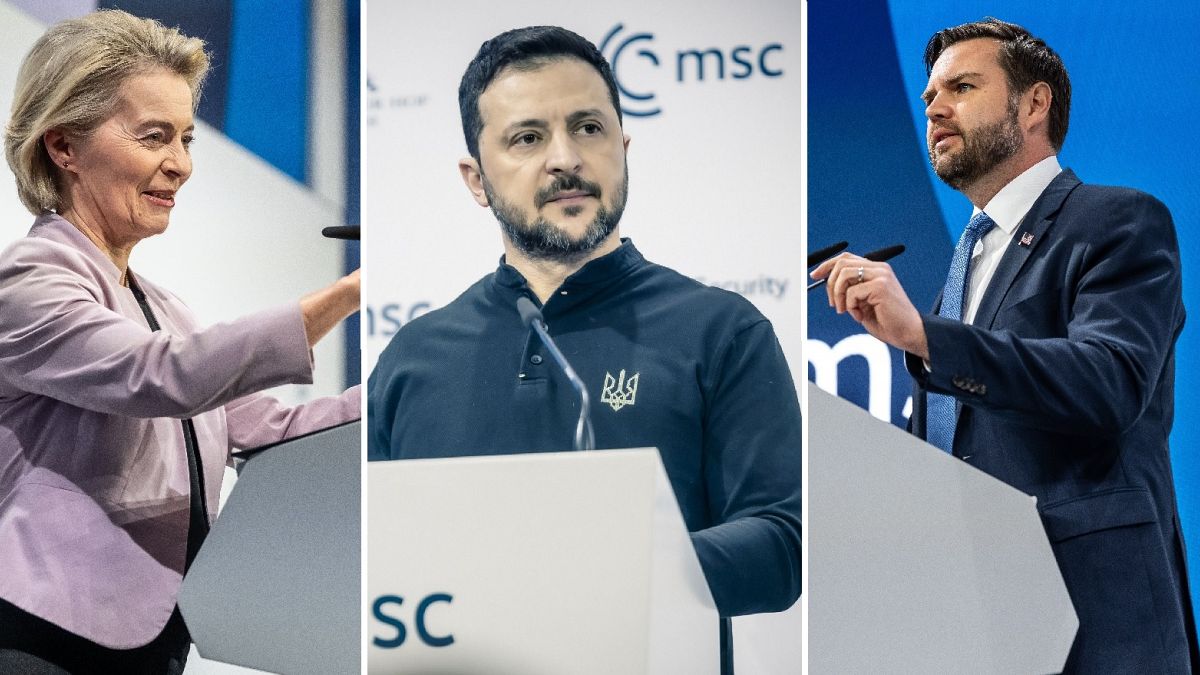Europe
Munich Security Conference: Here are the 7 quotes you need to remember

The Munich Security Conference: A Clash of Visions on Global Security and Leadership
The annual Munich Security Conference, held in the picturesque Bavarian city, brought together global leaders, ministers, and policymakers to discuss the most pressing challenges facing the world. Over three days, the gathering became a platform for competing visions of global security, with Ukraine and the potential launch of peace negotiations with Russia dominating the agenda. The event saw influential figures like Ukrainian President Volodymyr Zelenskyy, European Commission President Ursula von der Leyen, and U.S. Vice-President JD Vance deliver speeches that highlighted growing divisions between the two sides of the Atlantic. Their remarks not only exposed differing assessments of global threats but also revealed shifting priorities in transatlantic relations.
Ursula von der Leyen Calls for a "Bold New Approach" to European Security
European Commission President Ursula von der Leyen opened the conference on Friday with a significant announcement: she would propose activating the "escape clause" for defence investments. This move would allow EU member states to substantially increase their defence spending without violating EU fiscal rules. With the EU needing €500 billion in defence investments over the next decade, von der Leyen argued that Europe must take greater responsibility for its security. "When it comes to European security, Europe has to do more," she said. "Europe must bring more to the table." The proposal comes amid growing concerns about Russia’s military ambitions and the need for Europe to strengthen its defence capabilities.
JD Vance Warns of Europe’s Retreat from Fundamental Values
In a stark contrast to von der Leyen’s focus on external threats, U.S. Vice-President JD Vance shifted the spotlight inward. Vance expressed his deepest concern not over Russia, China, or other external actors, but over what he described as Europe’s retreat from its fundamental values. He accused Europe of backsliding on democratic principles and ignoring the voices of its citizens. "The threat that I worry the most about vis-a-vis Europe is the retreat of Europe from some of its most fundamental values," Vance said. His remarks, while critiquing Europe, also reflected the Biden administration’s growing frustration with Europe’s perceived lack of urgency in addressing global challenges.
Mark Rutte Reaffirms NATO’s Commitment to Ukraine
NATO Secretary General Mark Rutte addressed another critical issue: Ukraine’s NATO membership. Following recent comments by U.S. officials that seemed to suggest Ukraine’s aspirations to join the alliance might be sacrificed in peace negotiations with Russia, Rutte sought to clarify NATO’s position. "This is not about the peace deal," Rutte told reporters. "We have to make sure the deal ensures Putin will not try again." Rutte emphasized that NATO membership for Ukraine is not off the table, reaffirming the alliance’s commitment to Kyiv. His remarks were a direct response to speculation that Ukraine might be forced to abandon its NATO ambitions as part of a peace agreement.
Volodymyr Zelenskyy Advocates for a United European Defence Force
Ukrainian President Volodymyr Zelenskyy delivered a combative speech on Saturday, calling for the creation of an "Armed Forces of Europe." Zelenskyy argued that Europe’s future should depend solely on Europeans, with decisions about Europe being made in Europe. His remarks were a clear response to growing concerns about U.S. reliability in transatlantic security. "We cannot rule out the possibility that America may refuse to cooperate with Europe on issues that threaten it," Zelenskyy said. He also warned against any peace negotiations that exclude Ukraine, emphasizing that Kyiv would never accept deals made behind its back.
Friedrich Merz Pledges to Restore Germany’s EU Leadership
Friedrich Merz, the leader of Germany’s Christian Democratic Union (CDU) and a potential candidate for Chancellor, addressed the conference on Saturday. Merz acknowledged concerns about Germany’s waning leadership within the EU, promising to restore Berlin’s influence. "I’m hearing from the one-on-ones and the meetings here at the conference that there is a lack of German leadership within the European Union," Merz said. He emphasized Germany’s strategic position at the heart of Europe, arguing that many challenges facing the continent depend on German leadership. His remarks come ahead of Germany’s elections, where Merz is widely expected to succeed Olaf Scholz as Chancellor.
In conclusion, the Munich Security Conference revealed a world in flux, with leaders offering competing visions for global security and Europe’s role within it. While von der Leyen and Zelenskyy emphasized the need for Europe to take greater responsibility for its security, Vance’s critique of Europe’s values highlighted growing transatlantic tensions. As the conference came to a close, one thing was clear: the road ahead will require bold leadership, renewed commitments to shared values, and a united front in the face of growing global challenges.